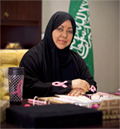|
 HRH Prince Khalid Al-Faisal put things into perspective when he raised the banner for all of us to see: “Towards world-class healthcare for women.” HRH Prince Khalid Al-Faisal put things into perspective when he raised the banner for all of us to see: “Towards world-class healthcare for women.”
And who would be better than King Abdulaziz University to take Prince Khalid’s words to heart? KAU has been pioneering many fields, and its head, Professor Osama S. Tayyeb, has made it his personal quest to turn KSU into a world-class institution.
This was the driver behind building excellence centers like ours, which focus on world-class healthcare research with the vision of taking the Kingdom’s healthcare to world-class levels. The Sheikh Mohammed Hussien Al-Amoudi Center of Excellence in Breast Cancer was the first building block in making this vision a reality.
Advanced nations have already established that the road to perfect healthcare begins with prevention, and one aspect of prevention is early detection of tumors. Unfortunately, in a fairly insular society like ours, prevention – much less early detection – does not enjoy much credence. Hence, it was imperative to spread that kind of culture in our society, especially in light of statistics that show staggering growth in breast cancer cases in Saudi Arabia, 70% of which are already in their advanced stages, diminishing chances of recovery, not to mention the financial burden they place on the nation’s resources.
So the center’s strategy was to make early detection the basis of its work. Early detection raises the odds for recovery to as high as 95%, which is why it is a must. Part of that strategy is to break the silence with awareness programs that use the media to spread the culture of early detection in the society. The center initiates workshops and awareness programs aimed at healthcare providers, made all the more significant by the fact that the university’s school of medicine is the academic home of future physicians, who must be not be sent out to the world without awareness of the importance of early detection.
To complete the structure of awareness about early detection, the center provides free mammogram detection, which is the ideal way of detecting tumors even earlier than the patient or her physician. The center also provides clinical breast examination of the breasts through a specialized clinic and workshops that teach patients methods of self-examination.
As a breast cancer survivor, a working physician and an international activist, I learned about a whole new concept of caring for breast cancer patients: one that relies on providing services that are essential to treatment, so as patients can have better chances of recovery while feeling fully supported.
This is achieved through support services and other support units. Therefore, we at the center created a consultancy clinic that receives a patients who have already been diagnosed by their physicians and give them advice and guidance addressing all their fears, apprehensions and questions, so as to help them get all the support they need. There is also a “survivors clinic” that care for recovered patients who need long-term monitoring, especially those who lose touch with their physicians after recovery but are likely to suffer some complications, thus necessitating the need for their own clinic at the center.
|